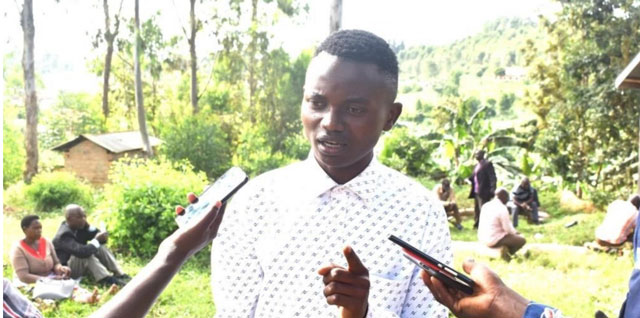
Rakai polling officials struggle to master Biometric Voter Verification System
Rakai, Uganda | THE INDEPENDENT | With just hours to the elections, several polling officials from different sub-counties in Rakai District say they didn’t fully understand how to use the Biometric Voter Verification System (BVVS) after a two-day’s training session they had last week.
The BVVS was introduced to improve the integrity of the electoral process through authentication of voter identity, according to the Electoral Commission. It basically uses fingerprints to match voter’s details and help the election officer to confirm that the voter is on the register of that polling station.
The Electoral Commission, through Sarah Nabukeera, the Acting Rakai District Registrar, organised a 2-day training at Kasozi Secondary School on January 6th and 7th for 520 polling officials to learn how to use the verification system.
When contacted on Tuesday, Sarah Nabukeera, the Acting Rakai District Registrar, told URN that she was yet to receive any complaint from the polling officials. She promised to contact all sub-county and parish supervisors to identify those who did not understand how the device operates to help them master it before elections.
The Electoral Commission on the election eve also confirmed all was well.
“In order to improve accuracy, security, efficiency and credibility in the delivery of electoral services, the Electoral Commission has acquired Biometric Voter Verification machines which will be used to verify voters who present themselves at polling stations on polling day,” the Electoral Commission said in a statement.
It was confident its teams across the country had been adequately trained. A statement to that effect stated that, “the training for field staff on the use of Biometric Voter Verification equipment has been successfully conducted at national, regional and district level. The Commission has concluded training of the Presiding Officer and the one Polling Assistant for the BVV machine.”
The biometric kits were supplied to Uganda by Smartmatic and were first used in the 2016 election, with voters scanning their fingerprints at polling stations to verify their identity. In September, the company won a Sh82.8 billion (US$22.4 million) delayed tender to finally supply equipment for the 2021 election.
Polling officers using the Biometric Voter Verification Kit (BVVK) for verification will be one of the key steps for voters on D-day Thursday. This process involves confirming if the person is of voting age and that their names appear on the voter’s register.
If the technology fails, like it did at the last elections, and in a previous Kenyan election, polling officers will have to use manual checks of the registry of voters.
It resulted in manual voting and manual submit election results.
Instructor overloaded
About the training in Rakai, several officials including presiding officers, polling assistants, parish and sub-county supervisors who talked to URN, say they had only one instructor to show them how the BVVS device works, and as a result, they did not fully grasp how it operates.
Joshua Bwambale, the Kayonza Parish Supervisor in Ddwaniro sub-county, says the trainer had a big load, which he couldn’t handle proficiently.
He says given the limited time, trainer chose to train one group, which he told to train others. He says the first group never had the skills to train fellow officials.
Patrick Kirembeka, a polling assistant from Kiwololo village in Kagamba sub-county, says the trainer had a big number of people and limited time. He explains that the trainer was too fast while handling different groups leaving behind the majority, especially slow learners.

Douglas Muhiirwe, a polling assistant from Kansankala sub-county, admits that he did not understand anything because the group that was trained to train them also did not understand how the BVVS works. He attributed it to the registrar who failed to hire more than one trainer to help the officials understand how the device operates.
Muhiirwe further explains that failure to understand the BVVS device will impede the election exercise. He appealed to the district Registrar to give them another opportunity to learn the device in the remaining few days to be sure of what to do on Election Day.
While several people faced a challenge learning the BVVS, Dorah Namayanja, another polling official from Buleebi village, Bugona Parish in Lwamaggwa sub-county, says she clearly understood how it works. She adds that given the knowledge she attained she can work on 30 people in an hour given the stability of the BVVS gadget.
*****
URN
 The Independent Uganda: You get the Truth we Pay the Price
The Independent Uganda: You get the Truth we Pay the Price



